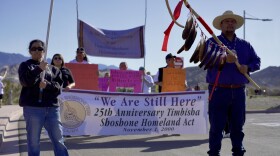Believe it or not, one of the most controversial debates in the West isn’t about conservative and liberal politics; it’s about wild horses.
Ever since Congress passed the Wild Horse and Burro Act in 1971, opinions about what to do with the horses varies wildly depending on who you talk to.
The Bureau of Land Management is the agency tasked with solving that difficult issue.
“ Wildish” is a new six-part podcast from High Country News that tells the story about the people tangled up in the world of wild horses.
Anna Coburn is the producer and host of the podcast.
“My main goal with this podcast series was I wanted to talk to people that spend their livelihoods, basically, around wild horses," she said, "That don’t just know about it from a Facebook post, that don’t just know about it in general but had never been out there. I wanted people who spend a lot of time with these wild horses.”
After talking to people with intimate knowledge of the wild horses, Coburn thinks of the wild horse issue as a spectrum with the Bureau of Land Management in the middle.
“Some people want the government to completely leave the wild horses alone. Some people would rather the wild horses all be rounded up and taken off the land and have no wild horses left, and then there is everybody else in between," she said.
So far, nobody along that range of opinions have been able to find a short term solution that makes everyone happy.
No matter which side people landed on the issue, Coburn noted, they all hated the BLM.
While no one can agree on a solution to the problems surrounding the wild horses, most everyone can agree that there is something fascinating about the animals and their symbolism in the West.
“They kind of represent this resiliency and this almost American spirit. I think that’s what makes wild horses so fascinating,” Coburn said.
One of the problems with the wild horses is how they got there. The horses were domesticated and then let loose, Coburn said, which means they are feral horses and that is how some people see them.
However, North American was home to an equine species a long time ago, which some people point to as a reason for them to be allowed to stay here.
Another aspect of the issue is the 1971 law, which mandated their protection.
Coburn explained that when the law was passed there were about 17,000 horses across 10 western states. The law said about 27,000 horses could live on the land without overtaxing it, but now an estimated 100,000 horses live across those 10 states.
“We are well passed that threshold they set a long time ago,” she said.
Those who want the horses removed completely note there are just too many of them, and they're competing with livestock for water and grazing resources
Those who want the horses left alone entirely say that nature will take care of the herds, but Coburn notes that's not really possible.
“A population, if it gets too big, disease or starvation or the land is completely grazed dry, those factors will control the population but the problem is we manage our wildlife, very much so, here in the United States. It’s not something we can do very easily to leave wildlife alone,” she said.
Coburn pointed out that Americans just don't leave wildlife on their own, from hunting to nuisance trappings, we are constantly managing the wildlife around us.
"That’s not something we’re okay with as a culture for wild horses. That’s why it’s so hard to untangle this problem.”
In addition, the 1971 law requires the BLM to manage and protect the horses, which is why the agency is gathering horses off the range.
Those roundups are another facet of the problems with the wild horses. The agency uses helicopters because it has found it is more humane compared with cowboys on horseback herding them into captivity, Coburn said.
"But watching the helicopter round up these horses is uncomfortable - personally," she said, "And I can understand why so many people are against it because even if I was watching elk or deer or any sort of wildlife out there being gathered by helicopter and seeing them be scared and running literally for their lives... it's just not a great thing to watch."
Coburn said sometimes horses trample each other or break a leg during the roundup, but it is the only method the agency has found to be effective and efficient on a large scale.
For the podcast, Coburn talked to several people with the BLM about the program. She said most just wanted to do their job but have often met with disdain from all sides.
“All except maybe a handful, just had this tone in their voice of just so defeated and so frustrated and really just wanted the public to know that they care about the horses, and they're trying to do their job, and they're not monsters," she said.
As for the future of the program, no one really knows what is ahead. Coburn said since a small fraction of the general population knows about the contentious issue there isn't a lot of momentum to come up with a solution and draw up new laws for management of the horses.
"I think right now it's just a small number of people that know about this, and so, we gotta get the ball rolling on the conversation," she said.
Coburn said she is actually more confused about the right way to approach the wild horse problem than when she started this project but she said that big topics like this - that aren't black and white - do need extended conversations to find the best path forward.
Anna Coburn, producer and host, "Wildish"









